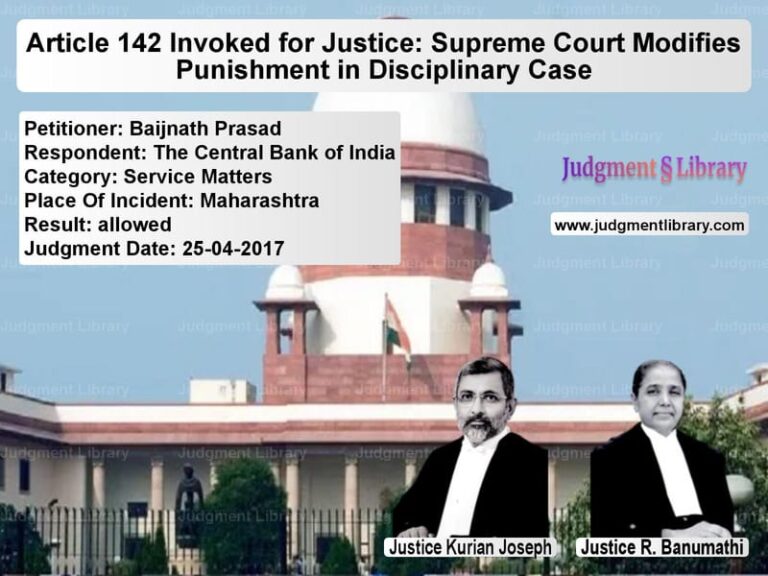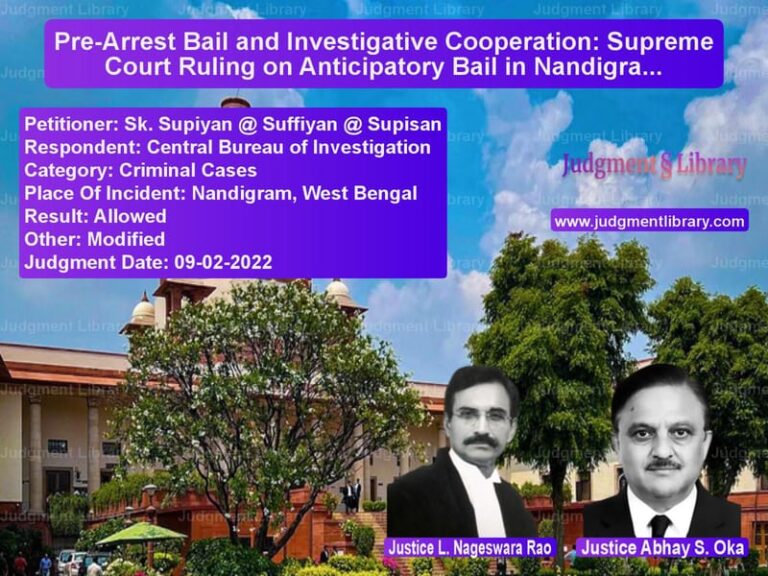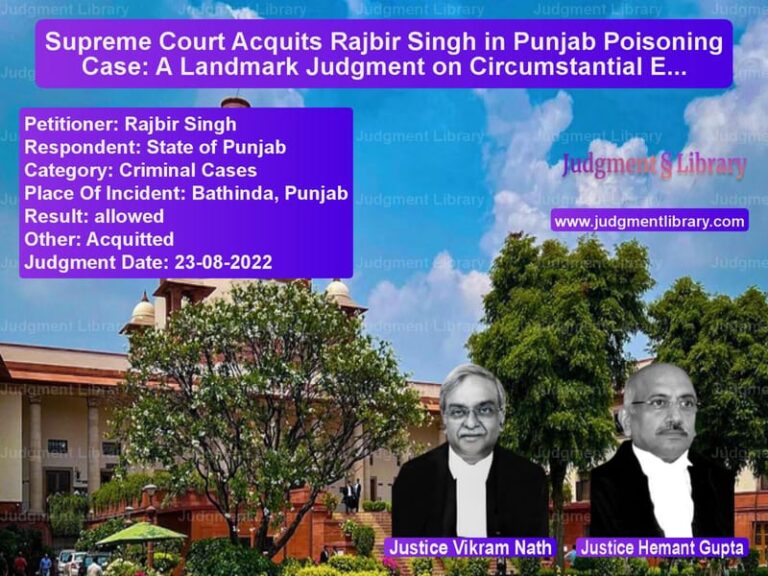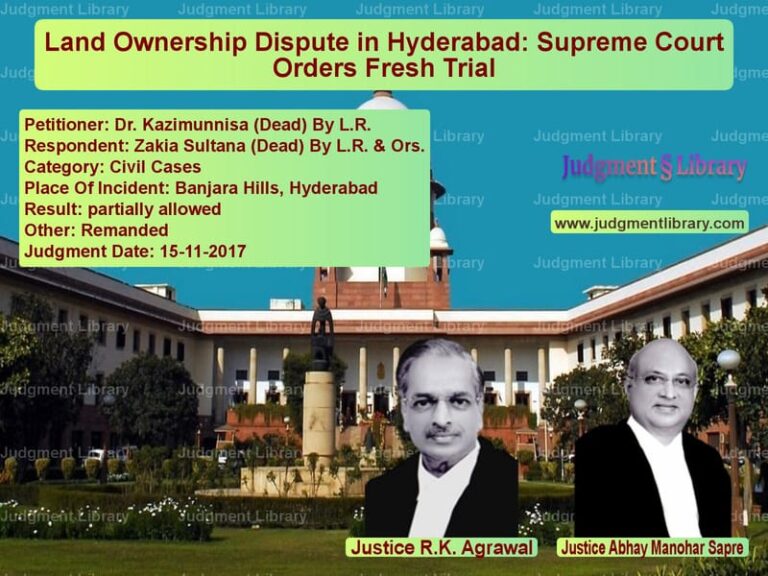Supreme Court Rules Captive Consumers Exempt from Additional Surcharge Under Electricity Act
The case of Maharashtra State Electricity Distribution Co. Ltd. vs. M/s JSW Steel Limited & Ors. revolves around whether captive consumers are liable to pay an additional surcharge under Section 42(4) of the Electricity Act, 2003. The Supreme Court ruled that captive consumers are not liable for the additional surcharge levied by state electricity distribution companies, reinforcing the principle that captive users form a distinct class under the Act.
Background of the Case
The appellant, Maharashtra State Electricity Distribution Co. Ltd. (MSEDCL), is a distribution licensee responsible for supplying electricity to consumers in Maharashtra. The respondents, including M/s JSW Steel Limited, are captive consumers—large industrial users that generate their own power through captive power plants (CPPs).
The dispute arose when MSEDCL sought to impose an additional surcharge on captive consumers using open access for electricity transmission. The Maharashtra Electricity Regulatory Commission (MERC) ruled in favor of MSEDCL, holding that captive consumers must pay the surcharge under Section 42(4) of the Electricity Act. However, the Appellate Tribunal for Electricity (APTEL) reversed this decision, ruling that captive consumers were exempt from additional surcharges. MSEDCL challenged this ruling in the Supreme Court.
Key Legal Issues
The Supreme Court had to decide:
- Whether captive consumers are liable to pay an additional surcharge under Section 42(4) of the Electricity Act, 2003.
- Whether the distribution licensee can impose such a surcharge despite the statutory rights of captive consumers.
Arguments of the Parties
Arguments by MSEDCL (Appellant)
MSEDCL argued that:
- The additional surcharge was necessary to compensate for the fixed costs incurred in maintaining distribution infrastructure.
- Captive consumers using open access to procure electricity from sources other than the distribution licensee should bear the additional surcharge.
- The levy of the additional surcharge was justified under Section 42(4) of the Electricity Act.
Arguments by JSW Steel and Other Captive Consumers (Respondents)
The captive consumers countered that:
- Captive generation is a statutory right under Section 9 of the Electricity Act, and no permission from the state commission is required.
- They had already invested in captive power plants (CPPs) and transmission infrastructure, making the additional surcharge unnecessary.
- Section 42(4) applies only to consumers who take supply from third-party generators, not captive users.
Supreme Court’s Analysis and Ruling
The Supreme Court analyzed the relevant provisions of the Electricity Act, 2003, particularly Sections 9 and 42.
Captive Generation as a Statutory Right
The Court reaffirmed that under Section 9(1) of the Electricity Act:
“Every person who has constructed a captive generating plant and maintains and operates such a plant shall have the right to open access for carrying electricity from his captive generating plant to the destination of his use.”
Thus, captive generation is not subject to regulatory permission, and open access for captive use cannot be denied.
Additional Surcharge Under Section 42(4)
The Supreme Court clarified that Section 42(4) applies only to consumers who receive electricity from a supplier other than their local distribution licensee, subject to regulatory approval. The Court ruled:
“Sub-section (4) of Section 42 shall be applicable only where the State Commission permits a consumer or class of consumers to receive supply of electricity from a person other than the distribution licensee. Captive consumers require no such permission, as they have a statutory right.”
Therefore, captive consumers do not fall under the category of consumers required to pay the additional surcharge.
Distinction Between Captive Consumers and General Consumers
The Court also emphasized that captive consumers are a distinct class from general consumers:
- They invest in their own power plants and transmission lines.
- Unlike ordinary consumers, they do not depend on the distribution licensee for power supply.
- Imposing an additional surcharge on captive users would violate the principle of non-discrimination.
Supreme Court’s Final Judgment
Based on these findings, the Supreme Court:
- Dismissed the appeals filed by MSEDCL.
- Upheld the APTEL ruling exempting captive consumers from additional surcharge.
- Directed MSEDCL to refund any additional surcharge already collected from captive consumers.
- Allowed adjustments of refunded amounts in future wheeling charges.
Key Takeaways from the Judgment
- Captive generation is a protected statutory right: Captive consumers have an inherent right to generate and transmit power for self-use without regulatory interference.
- Additional surcharge is not applicable to captive consumers: The surcharge under Section 42(4) applies only to consumers using third-party supply with regulatory approval.
- State electricity boards cannot impose arbitrary charges: The ruling prevents unfair charges on industrial consumers generating their own power.
- Captive users are a distinct class: They are treated separately from regular consumers due to their investment in independent power generation.
- Refund of unjustly collected surcharge: The Court directed the adjustment of previously collected additional surcharge.
Conclusion
This landmark ruling strengthens the legal position of captive power users by ensuring that state electricity boards cannot impose additional surcharges on them. It protects industrial consumers who invest in captive power plants and reinforces their statutory right to open access. The judgment is expected to have a significant impact on the energy sector, particularly for industries relying on self-generation for cost efficiency and reliability.
Petitioner Name: Maharashtra State Electricity Distribution Co. Ltd..Respondent Name: M/s. JSW Steel Limited & Ors..Judgment By: Justice M.R. Shah, Justice Sanjiv Khanna.Place Of Incident: Maharashtra.Judgment Date: 10-12-2021.
Don’t miss out on the full details! Download the complete judgment in PDF format below and gain valuable insights instantly!
Download Judgment: maharashtra-state-el-vs-ms.-jsw-steel-limit-supreme-court-of-india-judgment-dated-10-12-2021.pdf
Directly Download Judgment: Directly download this Judgment
See all petitions in Bankruptcy and Insolvency
See all petitions in Corporate Compliance
See all petitions in unfair trade practices
See all petitions in Judgment by Mukeshkumar Rasikbhai Shah
See all petitions in Judgment by Sanjiv Khanna
See all petitions in dismissed
See all petitions in supreme court of India judgments December 2021
See all petitions in 2021 judgments
See all posts in Corporate and Commercial Cases Category
See all allowed petitions in Corporate and Commercial Cases Category
See all Dismissed petitions in Corporate and Commercial Cases Category
See all partially allowed petitions in Corporate and Commercial Cases Category







